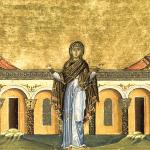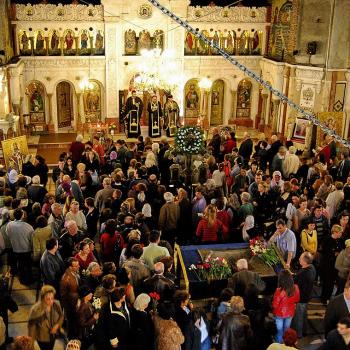
Source: Rick’s Visualizations / flickr
We are on a journey – a journey towards our true homeland, the kingdom of God. Along the way we will come to know ourselves. Who am I? What am I? What is my purpose? What exactly is this “I” that I speak of? Unless we come to know ourselves, unless we come to know and understand what this “I” is, and what it is not, we will not find our way to the kingdom of God. It is only by coming to know who we truly are, only by coming to know our true face in the eternity of God, can we find ourselves free from all error: for it is ignorance of the self, ignorance of who and what we are and what we are not, which leads us to act and react in ways contrary to our own good. In our ignorance, we find ourselves seeking out and desiring those things which do us no good, seeking to hold on to them and possesses them for their apparent goodness, leading to all kinds of inordinate clinging and attachment, all the while we despise and hate, indeed, seek to destroy all those who get in our way from attaining such inappropriate goods. That is, our ignorance of ourselves, who and what we are, and what really is good for us, leads us to bad attachments to those things which we improperly think will bring to us the fullness of the good which we want as well as ill-will and spite against all those who oppose our appropriation of such apparent goods (and it should not be surprising, we will often despise those who oppose our desire even though their opposition will actually lead us to a greater good than what would be had if we attained our desire).[1] St. Theodoros, therefore, said ignorance is the root of all our evils:
Indeed, ignorance is the root of all evils. For no one who has once grasped as he should the true nature of things – from where each thing comes and how it is perverted – can then totally disregard his own purpose and be dragged down to worldly things. The soul does not want a good that is only apparent. [2]
So long as we remain ignorant, we will act foolishly, often contrary to our own proper good and so we will act in ways which will bring us suffering. “It is not good for a man to be without knowledge, and he who makes haste with his feet misses his way” (Prov. 19:2 RSV). We might attain some momentary pleasure, to be sure, but once that moment is past, the angst of life will return, and we will either desire more and more such pleasures, finding out that we have become addicts who find such pleasure satisfies us less and less, or else find ourselves moving on to the next, best thing, hating all that we think will hinder us from attaining our new desire. The teachings of the Christian faith are meant to help us overcome our ignorance so that we can follow the path of virtue to beatitude. They reveal to us the ways of overcoming the inordinate passions and malice which such ignorance generates, which is why we are exhorted, once we have come to the faith, to act according to the wisdom of the faith and not return to the foolish ways which come from such ignorance: “For we ourselves were once foolish, disobedient, led astray, slaves to various passions and pleasures, passing our days in malice and envy, hated by men and hating one another” (Tit. 3:3 RSV).
Follow the path of righteousness, to be sure, is not easy. We have developed bad habits which we must fight against them. The more we act, the more habits we develop, and the more bad habits can affect us so that like an addict, we will find ourselves ignoring exhortations to the contrary as our intellect is hindered by the desires generated by our actions. That is, because of the habits which we have developed, our minds have become defiled, filtering thoughts according to the desires which we have set up for ourselves. Thus, it can be said, we habitually think along the lines established by our passions, as St. Neilos the Ascetic understood:
Each passion, when active within someone whom it controls, holds is intelligence in chains; why, then, cannot zeal for holiness keep our mind free from everything else? When an angry man fights in his imagination against the person who has offended him, is he conscious of anything external? Is not the same true of the man who desires material possessions, when he imagines ways of getting what he wants? And the lustful man, even when in the company of others, often becomes oblivious of his surroundings and sits like a block of stone, saying nothing, thinking only of the women he desires; turning in upon himself, he is completely absorbed by his own fantasies. [3]
If we want the kingdom of God, if we want to experience the kingdom of God, not just in death, but in life, we must free our mind from all defiled forms of thinking. We must hold to and act upon what is just and good; what is unjust and wicked, we must avoid. Thus, St. Hesychios the Priest exhorted his readers:
If you do not want to suffer evil, do not inflict it, since the suffering of it inevitably follows its infliction. ‘For whatever a man sows he will also reap’ (Gal. 6:7). Reaping unwillingly the wickedness we deliberately sow, we should marvel at God’s justice.[4]
Until we know the truth innately, we must rely upon the aids God has given us, not only the grace which we need in order to cleanse ourselves from such defilements and to be healed from harm we have caused to ourselves by acting foolishly, but also the wisdom offered by Scripture and good and holy men and women who have come to know God and can radiate his just love and truth to all who come upon them. We must walk the path of righteous, following the example of the righteous before us, not slavishly imitating them, but discerning the prudence of their actions and acting in a way which such prudence indicates in our own particular situations. We must not, however, follow the way of those who do evil, those who promote injustice:
Do not enter the path of the wicked, and do not walk in the way of evil men. Avoid it; do not go on it; turn away from it and pass on. For they cannot sleep unless they have done wrong; they are robbed of sleep unless they have made some one stumble. For they eat the bread of wickedness and drink the wine of violence. But the path of the righteous is like the light of dawn, which shines brighter and brighter until full day. The way of the wicked is like deep darkness; they do not know over what they stumble (Prov. 4:14-19 RSV).
Those who promote injustice will suggest the pleasure which they offer fulfills the desires of the soul, but all they offer is but a poor imitation of the good which will never truly satisfy us. If we watch them, their actions will show how far they are from happiness themselves as they attack and harm the innocent for the sake of their own personal pleasure. “He who says he is in the light and hates his brother is in the darkness still” (1Jn. 2:19 RSV). The wicked will show their hate, and in doing so, show they are not offering the path towards wisdom and happiness. They will ravish the world and all that is in it, spoiling it for their personal gain, trying to make it theirs, until at last, they tire of it and toss it away like a piece of trash. If they cannot do so, then they their ill-will, their spite will reign supreme while they find sophistical excuses to justify their abuse.
“Hatred stirs up strife, but love covers all offense” (Prov. 10:12 RSV). The righteous will show themselves to be just because they will act in accordance to the dictates of love. They will not seek to dominate or destroy, but rather lift up and heal the harm others have unjustly suffered. The more they act in love, the more they will realize their proper relationship with others, and begin to understand themselves. The more they understand themselves, the freer they will be, until they know themselves as they are and therefore, know themselves in relation to God and his dispensations so that they will be able to be truly free in Christ, as St. Antony the Great explained in his letters:
The rational man who has prepared himself to be set free through the advent of Jesus, knows himself in his intellectual substance. For he who knows himself knows the dispensations of the Creator and all that He does among His creatures. [5]
We must seek wisdom. To seek it, we must act upon it, to let the wisdom which we have attained form us, purifying us from those actions which we have done in ignorance so that we can then attain more wisdom, more understanding of ourselves, by which we can act better. Then, when we have truly prepared ourselves to be set free, we will find ourselves in the kingdom of God, attaining, therefore, union with God in and through Jesus Christ: this is the advent of Jesus which we must seek.
[1] This, then, demonstrates the wisdom contained in the Buddhist tradition as it discusses the three great poisons, the three great unwholesome roots our character flaws, which make us suffer: moha (ignorance), raga (greed, desire, lust, attachment), and dveṣa (hate and aversion).
[2] St. Theodoros the Great Ascetic, “Theoretikon” in The Philokalia: The Complete Text. Volume Two. Trans. G.E.H. Palmer, Philip Sherrard, Kallistos Ware et. al. (London: Faber and Faber, 1990), 46.
[3] St. Neilos the Ascetic, “Ascetic Discourse,” in The Philokalia: The Complete Text. Volume One. Trans. G.E.H. Palmer, Philip Sherrard, Kallistos Ware et. al. (London: Faber and Faber, 1983), 249.
[4] St. Hesychios the Priest, “On Watchfulness and Holiness,” in The Philokalia: The Complete Text. Volume One. Trans. G.E.H. Palmer, Philip Sherrard, Kallistos Ware et. al. (London: Faber and Faber, 1983), 172.
[5] St. Antony, “Letter III” in The Letters of Saint Antony the Great. Trans. Derwas J. Chitty (Fairacres, Oxford: SLG Press, 1991), 9.
Stay in touch! Like A Little Bit of Nothing on Facebook













